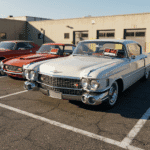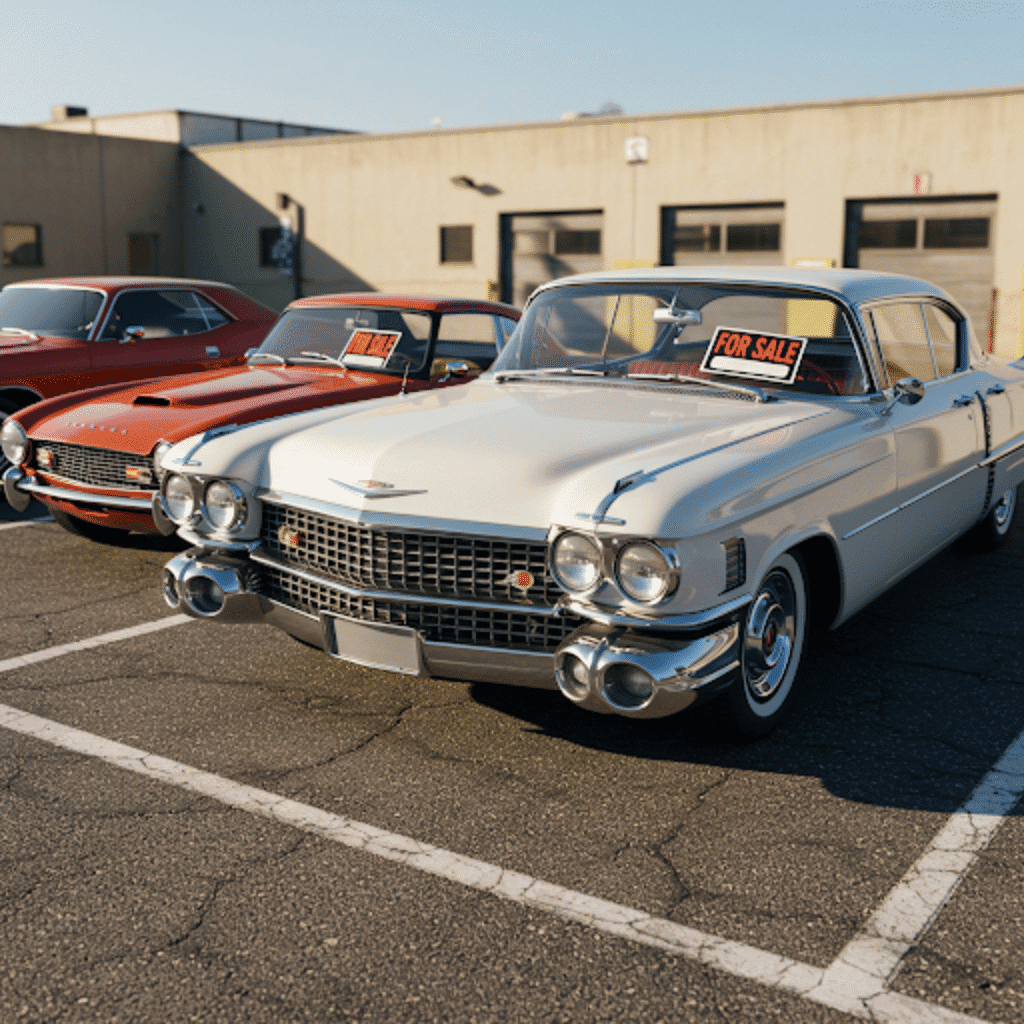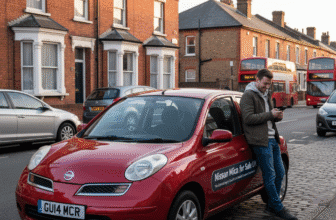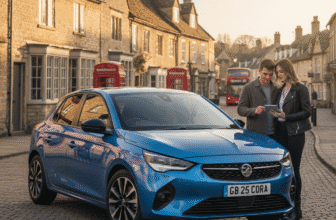
The Enduring Allure: Navigating the World of Classic Cars for Sale in the UK
There’s a certain magic surrounding classic cars, isn’t there? It’s more than just metal, rubber, and glass. It’s a tangible connection to a bygone era, a rolling piece of history, and often, a work of art. For many in the UK, the dream of owning a classic car – whether it’s a sleek British sports car, a charming continental cruiser, or a rugged off-roader – is a powerful one. The sight of polished chrome gleaming in the sun, the distinctive burble of an older engine, the smell of aged leather – it evokes nostalgia, admiration, and a sense of simpler times. But moving from admirer to owner requires navigating the exciting, yet sometimes complex, market of classic cars for sale. This guide aims to equip you with the knowledge needed to embark on this rewarding journey.
Why Choose a Classic Car?
Before diving into the ‘how’ and ‘where’, let’s consider the ‘why’. What draws people to invest time, money, and passion into vehicles that often lack modern comforts and conveniences? The motivations are as varied as the cars themselves:
- Investment Potential: While not guaranteed, many classic cars have appreciated significantly over time. Choosing the right model, maintaining it well, and understanding market trends can potentially yield financial returns, often outperforming traditional investments. However, this should rarely be the sole motivation.
- The Driving Experience: Modern cars are incredibly capable, comfortable, and efficient. But classic cars offer something different – a more engaging, analogue driving experience. You feel more connected to the road, the mechanical workings are more transparent, and every journey feels like an event.

- Nostalgia and Heritage: Many seek cars that remind them of their youth, vehicles their parents owned, or models they admired from afar. Owning a classic connects you to Britain’s rich automotive heritage or the iconic designs from around the globe.
- Aesthetic Appeal: Car design has evolved, but the lines, curves, and details of many classic cars possess a timeless beauty often lost in modern aerodynamics and safety regulations. They stand out from the crowd.
- The Community: Classic car ownership opens doors to a vibrant and passionate community. Car clubs, shows, rallies, and online forums provide opportunities to share experiences, gain knowledge, and forge friendships with like-minded enthusiasts.
- The Joy of Restoration and Maintenance: For the mechanically minded, bringing a tired classic back to its former glory or simply keeping a cherished vehicle in top condition provides immense satisfaction. It’s a hands-on hobby that teaches skills and rewards patience.
Where to Find Your Dream Classic Car in the UK
Once you’ve decided a classic car is for you, the hunt begins! Thankfully, the UK has a thriving classic car scene with numerous avenues to explore:
Specialist Classic Car Dealers
These businesses live and breathe classic cars. They often curate their stock, focusing on specific marques, eras, or types of vehicles.
- Pros: Expertise and knowledge, cars often inspected and prepared to a high standard, potential for warranties or after-sales support, established reputation. They handle the paperwork and offer a showroom experience.
- Cons: Prices tend to be higher than private sales due to overheads, preparation costs, and profit margins. Stock might be limited to their specialisation.
Look for dealers who are members of trade associations or have long-standing positive reputations within the classic car community.
Classic Car Auctions
Auctions offer an exciting way to buy a classic, with the potential for finding unique models or securing a bargain. Major auction houses hold regular classic car sales across the UK, and numerous online auction platforms have emerged.
- Pros: Wide variety of cars available, potential for competitive pricing (sometimes below market value), transparent bidding process, detailed catalogues often provided.
- Cons: Can be high-pressure environments, limited time for thorough inspection, buyer’s premium adds significantly to the hammer price, ‘sold as seen’ nature means little recourse if issues arise later. Thorough pre-auction inspection and setting a strict budget are crucial.
Private Sales
Buying directly from a current owner is a very common route. These cars are often advertised in classic car magazines, online classified websites (like Car & Classic, PistonHeads, Auto Trader Classics), specialist forums, or even through car club newsletters.
- Pros: Potential for lower prices compared to dealers, opportunity to speak directly with the owner about the car’s history and quirks, possibility of negotiation.
- Cons: Requires more effort from the buyer regarding inspection and due diligence, no warranty or comeback (‘caveat emptor’ – buyer beware applies), potential for sellers to misrepresent the car’s condition.
Online Marketplaces
Beyond general classifieds, dedicated classic car marketplace websites consolidate listings from dealers and private sellers across the UK and sometimes internationally. These platforms offer powerful search filters and often host detailed descriptions and multiple photos.
- Pros: Huge selection in one place, easy comparison of prices and models, convenient searching from home.
- Cons: Need to be vigilant about scams, descriptions can be misleading, essential to view and inspect the car in person before committing.
Car Clubs
Joining an owners’ club for the marque or model you’re interested in is invaluable. Clubs often have ‘For Sale’ sections in their magazines or on their websites, featuring cars owned by fellow enthusiasts.
- Pros: Cars often well-maintained by knowledgeable owners, access to model-specific expertise within the club, buying from a known community member.
- Cons: Selection is limited to what members are currently selling.
Classic Car Shows and Events
Major events like the Goodwood Revival, NEC Classic Motor Show, or numerous regional gatherings are fantastic places to see classics up close, talk to owners, and sometimes find cars advertised for sale.
- Pros: Opportunity for informal networking, seeing cars in the metal, discovering models you hadn’t considered.
- Cons: Primarily social events; finding cars actively for sale might be hit-or-miss.
The Crucial Pre-Purchase Inspection: What to Look For
Finding a car is one thing; ensuring it’s the *right* car is another. Rushing into a purchase without thorough checks is the quickest route to disappointment and unexpected expense. Arm yourself with knowledge and be methodical.
1. Research is King
Before viewing any car, become an expert on the specific model. Understand its common weak points, typical rust areas, mechanical vulnerabilities, and approximate market values for different conditions (concours, excellent, good, project). Online forums, owners’ clubs, and buyer’s guides are invaluable resources.
2. The Walk-Around: Bodywork and Structure
This is arguably the most critical area, as bodywork repairs can be the most expensive.
- Rust: The arch-nemesis. Check meticulously: wheel arches (inner and outer), sills (underneath and along the seam), door bottoms, boot floor, bulkhead, chassis rails/outriggers (if applicable), suspension mounting points, around windows and lights. Prod gently with fingers (with owner’s permission) or use a small magnet to detect filler. Lift carpets and check floors.
- Panel Gaps: Look for consistent gaps between doors, bonnet, and boot. Uneven gaps can indicate past accident damage or poor restoration.
- Paintwork: Check for mismatched colours, overspray on trim, bubbles (signalling underlying rust), cracks, or excessive orange peel effect.
- Accident Damage: Look for ripples in panels, creases, or signs of repair underneath. Check chassis legs for straightness.
3. Under the Bonnet: Engine and Mechanics
- Cold Start: Ideally, see the engine started from cold. Watch for excessive smoke from the exhaust (blue=oil, black=fuel, white=water/head gasket). Listen for rattles, knocks, or uneven running.
- Leaks: Check under the car and around the engine/gearbox/axle for oil, coolant, or fuel leaks.
- Fluids: Check oil level and condition (is it sludgy or milky?). Check coolant level and look for oil contamination.
- Service History: A comprehensive history file adds significant value and peace of mind. Look for regular maintenance stamps, invoices for work done, and MOT certificates.
4. On the Move: Drivetrain, Suspension, Brakes
- Gearbox & Clutch: Check for smooth gear changes (both up and down), listen for whining or crunching noises. Check clutch operation – bite point, slipping under load.
- Suspension & Steering: Listen for knocks or clunks over bumps. Check for excessive play in the steering wheel. Does the car pull to one side?
- Brakes: Test their effectiveness. Do they feel spongy? Does the car pull to one side under braking? Check discs/pads for wear and lines for corrosion.
5. Electrics and Interior
- Electrics: Test everything: lights, indicators, wipers, horn, heater fan, gauges, radio. Electrical gremlins can be notoriously difficult and time-consuming to fix on older cars.
- Interior: Check the condition of seats (springs, padding, covers), carpets (dampness underneath?), headlining, dashboard (cracks?), door cards, and trim. Is it original? Replacing worn or incorrect interior trim can be expensive.
6. Paperwork Trail
- V5C Logbook: Ensure the seller’s name and address match, and check the VIN (Vehicle Identification Number) and engine number on the document match those on the car itself.
- MOT History: Even if exempt, check the online MOT history (gov.uk website) for past advisories and failures – it gives clues to ongoing issues.
- History File: Invoices, photos of restoration, club documentation – anything that builds a picture of the car’s life is valuable. Provenance (history of ownership) can add value, especially for rare cars.
7. Professional Inspection
If you’re not mechanically confident, or if it’s a high-value purchase, investing in a professional pre-purchase inspection (PPI) from a classic car specialist or motoring organisation (like the AA or RAC, although specialist knowledge is preferable) is highly recommended. They know exactly where to look and can provide an unbiased assessment.
Popular Classic Car Choices in the UK
The UK market offers a vast array of classics. Here are just a few perennial favourites:
- MGB: The quintessential British sports car. Plentiful, affordable, fantastic club support, and easy parts availability. Available as Roadster or GT.
- Jaguar E-Type: An automotive icon. Stunningly beautiful, prices have soared but still represent performance and style. Series 1 cars are most coveted.
- Classic Mini: Fun, classless, and brilliant to drive. Early Cooper S models are valuable, but standard saloons offer affordable entry. Rust is the main enemy.
- Land Rover Series I, II, III: Utilitarian chic. Hugely capable off-road, simple mechanics, and a massive following. Values are strong.
- Ford Escort Mk1/Mk2: Rally legends and hugely popular classics. Mexico, RS, and Twin Cam versions are highly sought after, but standard models have charm.
- VW Beetle / Campervan: Enduring German icons. Air-cooled simplicity, huge community, and timeless appeal. Campervans (especially early ‘split-screen’ models) are very desirable.
- Morris Minor: Charming, practical, and quintessentially British. Easy to work on, good parts supply. Available as saloon, convertible (Tourer), or Traveller (estate).
- Triumph TR Series (TR2-TR6): Hairy-chested roadsters offering strong performance and classic British sports car looks. TR6 remains particularly popular.
Budgeting Beyond the Purchase Price
The sticker price is just the beginning. Factor in these ongoing costs:
- Insurance: Specialist classic car policies are often cheaper than standard insurance. They may have mileage limits and require secure storage. Agreed value policies are recommended.
- Road Tax (VED): Vehicles constructed more than 40 years ago are generally exempt from VED in the UK (check current gov.uk rules).
- MOT: Cars over 40 may also be MOT exempt, provided they haven’t been substantially altered. However, regular safety checks are still highly advisable.
- Maintenance & Repairs: Parts can range from cheap and plentiful (MGB, Mini) to rare and expensive (E-Type, exotic marques). Specialist labour can be costly. Set aside a contingency fund.
- Fuel: Classic cars are rarely fuel-efficient!
- Storage: A dry garage is ideal to protect your investment from the elements and theft. Consider dehumidifiers or car covers.
- ULEZ/Clean Air Zones: Be aware of potential charges or restrictions for driving older, non-compliant vehicles in certain city centres. Historic vehicles often have exemptions, but check local regulations.
The Joys Await
Owning a classic car is a commitment, but the rewards are immense. It’s about preserving automotive history, enjoying a unique driving sensation, engaging with a passionate community, and the simple pleasure of owning something beautiful and characterful. The search for classic cars for sale in the UK can be an adventure in itself. Take your time, do your homework, inspect thoroughly, and budget wisely. Find the right car, and you’ll be embarking on a journey filled with memorable drives, admiring glances, and the enduring satisfaction of keeping a piece of motoring heritage alive on British roads.







